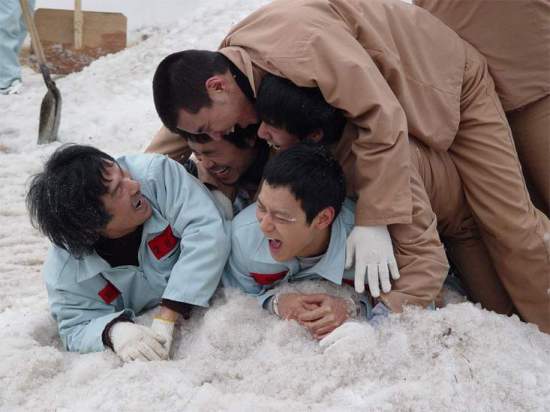Typically in the romance genre, the manner in which love begins is through trite happenstance – an accidental injury; a misunderstanding; a hot tub time machine. Not so in Maundy Thursday (AKA Our Happy Time (우리들의 행복한 시간), which buckles all conventions in the development of love.
The romantic drama features a rebellious suicide survivor who, with regular visits to jail at the behest of her Catholic nun aunt, becomes enamored with a death row inmate. Far removed from traditional representations of romance, Maundy Thursday is a riveting cinematic delight, a highly character-driven film that exemplifies the importance of sharing sadness as well as happiness in the creation of love.
Moon Yu-jeong (Lee Na-young (이나영) is a suicide survivor, presenting a particular problem for her devoutly Catholic family and overbearing, selfish mother. Yu-jeong’s aunt, a Catholic nun, persuades her niece to join her on her weekly volunteer work at a prison, attempting to give hope and salvation to the prisoners. Reluctantly agreeing, Yu-jeong and her aunt meet rapist and murderer Jung Yeon-soo (Kang Dong-won (강동원). Initially incredibly hostile towards each other, the pair gradually reveal more about their tortured pasts, their hopes, their fears, and become irrevocably changed through the love that blossoms between them.
Maundy Thursday is a highly compelling and poignant romantic drama that embraces the darker and more tragic aspects of society in its depiction of love. Such a philosophy is ultimately what makes the film so unique and enthralling, as screenwriters Jang Min-seok (장민석) and Park Eun-yeong (박은영) never shy from exploring how character evolves through the unfair machinations of society, which director Song Hae-seong (송해성) wonderfully conveys. Working class Yeon-su has been abandoned by his mother and delved into a life of crime that has led to his incarceration; Yu-jeong is from a privileged upper-middle class background yet the overbearing Catholicism and rigid lifestyle has left her scarred. Technically two such protagonists should never become intertwined yet the narrative is so organic and flows so well that their meetings – which occur every Thursday – and the development of their relationship are natural and believable. Scenes in which the duo share their emotional pain, eloquently told through dialogue and flashbacks, are simultaneously heartbreaking and endearing revealing not only the suffering endured by people of all walks of life but how such turmoil can bring them together once shared. Acknowledging personal trauma, confronting it, and sharing it with someone special are the driving forces within Maundy Thursday, and the affection and love that blossoms from such pain are masterfully conveyed and deeply poignant.
A social group that does not express such qualities within Maundy Thursday are members of the Catholic faith. The film wonderfully explores how the concept of religion can be taken and abused by a practicing individual with horrifying results. With the exception of the kind Catholic priests and nuns within the prison, Catholicism is represented through Yu-jeong’s family, primarily her abhorrent mother. Director Song Hae-seong (송해성) masterfully portrays the eccentric and arrogant nature of the Catholic family, with expensive ornaments adorning the rigidly structured family home, the repressed clothing style of turtle-necks and high collars, and the snobbery and ignorance in spite of family trauma. The decor within the family home are an amalgamation of reds, oranges and yellows conveying the genuine ‘hell’ that exists there, while the pale-faced black-clothed mother, who is equal parts scary and manipulative, functions as the devil. Yet only Yu-jeong perceives the hypocrisy of her family, chastised for stating truths to people more concerned with rhetoric and status. Yu-jeong’s loneliness and rebellious nature are emphasized to such a degree that it is impossible not to empathize with the character, making her relationship with inmate Yeon-su all the more touching.
Lee Na-young is absolutely captivating in her performance as Yu-jeong. The actress masterfully conveys the tumultuous emotional well deep within the character, from her agitated moments of familial defiance and indifference to criticism through to more challenging maternal confrontations and expressions of past anguish. Lee Na-young’s performance is by far the most captivating, compelling and poignant aspect of Maundy Thursday and as such the film is ultimately her story.
Kang Dong-won takes more of a supportive role in his performance as Yeon-su, yet he also conveys a staggering emotional range. His ill-mannered behaviour and resolute desire to die are highly engaging, yet the occurrence of more dramatic scenes such as confronting the mother of his victim and his subsequent breakdown create incredible empathy with the killer. The fashion in which Yeon-su evolves from a man without hope to finding happiness is wonderfully portrayed by the highly skilled actor.
Verdict:
The focus on societal and religious discourses, and the love that can develop through sharing personal trauma, make Maundy Thursday a unique and incredibly compelling romantic drama. The performances by the central couple are wonderful and the manner in which they develop feelings of romance are organic and highly convincing. Maundy Thursday is an excellent portrayal of alternative romance, and a poignant reminder of the value of sharing pain and happiness within a relationship.
★★★★☆





I am still debating with myself whether to go see this film when they screen it at the KCCUK in November. I read the Japanese manga (which is based on a Korean novel) and cried bucketloads. Not sure if I want to sit at the KCCUK with tears streaming down my face for half an hour!
I totally understand, I was quite relieved I was alone after my tears finally stopped! But then, I think that’s the mark of a great film – one that has the power to move people to tears and reflect on their lives. I hope the KCCUK prepares plenty of tissues for their screening!
Before I totally forget, you earned yourself some brownie points from me 😀 by publicly declaring that the film made you cry! Most guys still don’t admit to that…